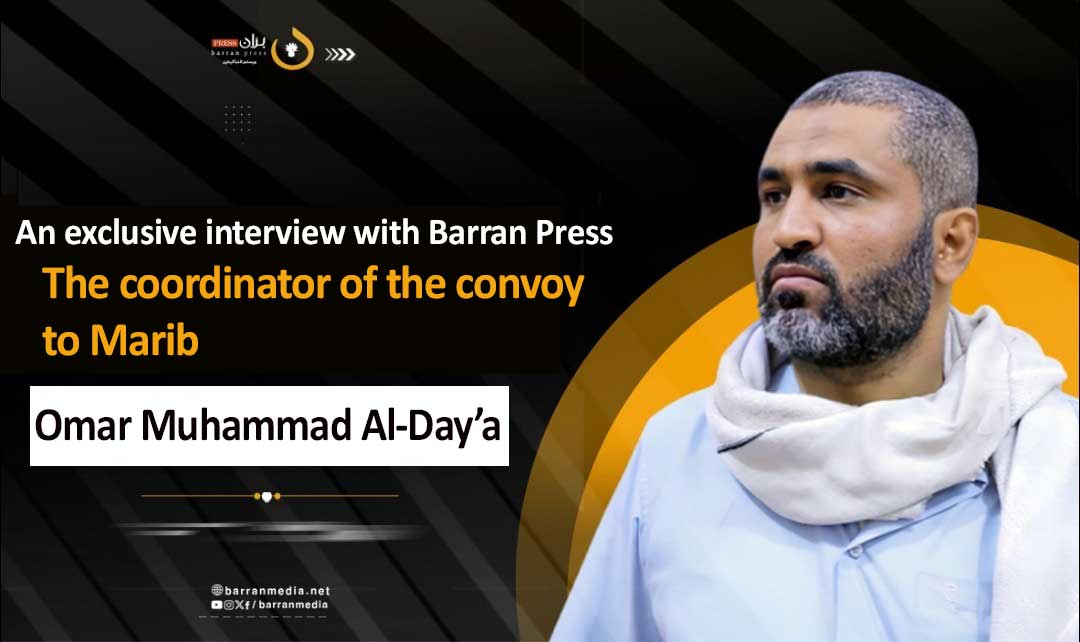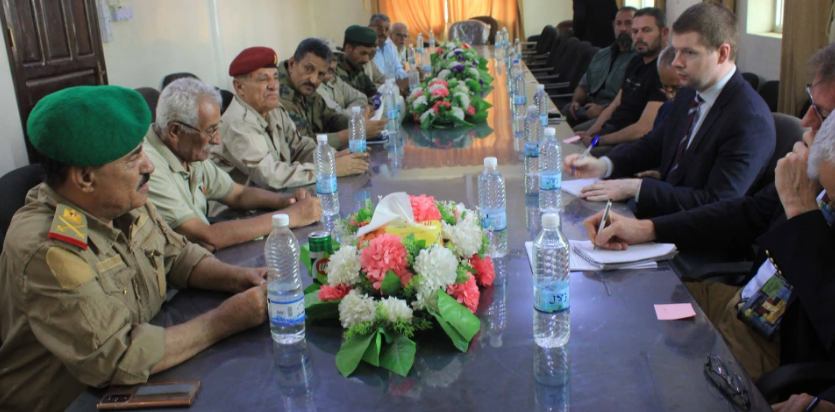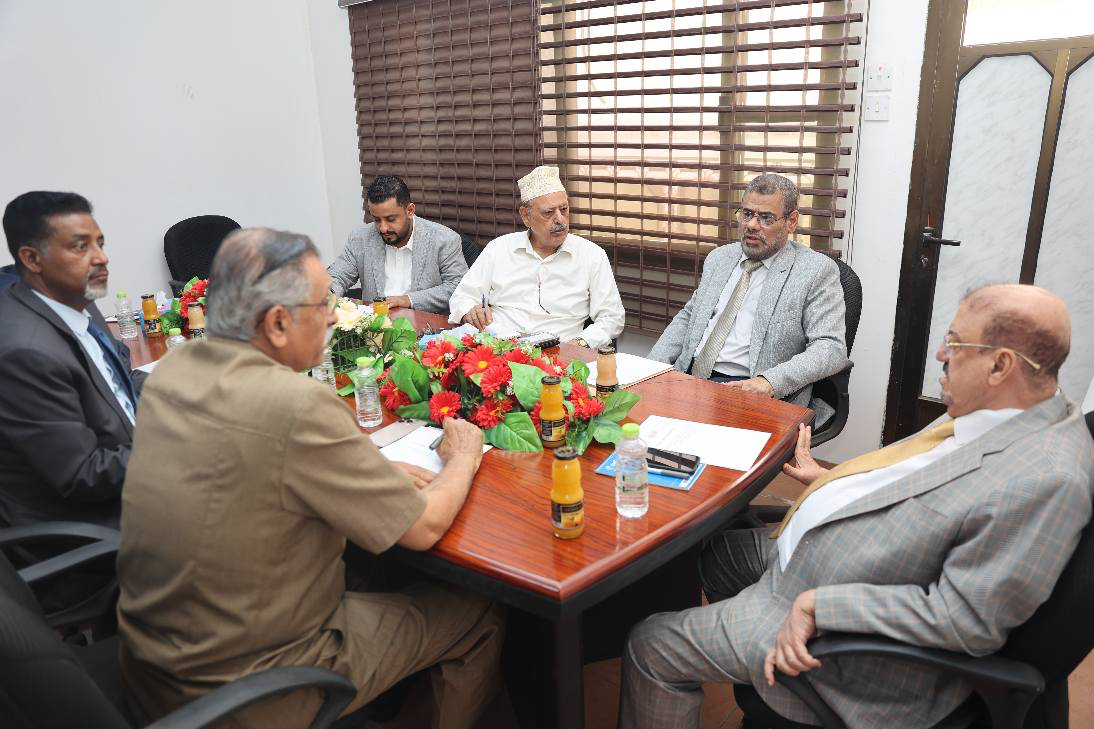
Barran Press
At noon on Tuesday, after a six-day wait for Houthi approval, the convoy of travelers from Sanaa and Al-Bayda successfully reached the Al-Juba District, located in the southern part of Marib Governorate, to implement the Road Opening Initiative. The convoy, consisting of dozens of cars, managed to cross the Houthi-controlled checkpoints in "Qaniya," despite the group's international classification as a terrorist organization. However, their attempt to enter the city of Marib without prior coordination with the official and security authorities necessitated the involvement of Omar Muhammad Al-Day’a, who led a group of convoy participants to facilitate the entry procedures.
In an exclusive interview with Barran Press, Omar Muhammad Al-Day’a, the coordinator of the convoy, shed light on the initiative's details, goals, and motives. Al-Day’a stated that their initiative was born out of the hardships faced by travelers on the desert and Al-Jawf road, which typically takes over eight hours to traverse, while alternative routes could be completed in two to two and a half hours. The Houthi group, internationally recognized as a terrorist organization, declared the opening of the Marib-Al-Bayda-Sana'a road today, more than 100 days after Governor Sheikh Sultan Al-Arada's unilateral proposal to open all roads connecting Marib and Sana'a.
Al-Day’a emphasized that their initiative was purely humanitarian and aimed to serve society, dissociating it from any political party or faction. He informed Barran Press that they chose to initiate the Al-Juba (Marib-Al-Bayda) route because both the Marib authorities and the Houthi group had previously announced its opening through official statements. However, there has been no response or tangible progress in implementing the Fatah Road initiative, as proposed by Governor Al-Arada.
Acknowledging the complexity imposed by the ongoing war, Al-Day’a commented, "The war has complicated the lives of people in every aspect." He expressed their determination to complete the opening of the Al-Juba road and subsequently proceed to the Fardhah road, provided there is cooperation from both parties. Al-Day’a expressed hope to gradually open all the roads if further collaboration is achieved.
Addressing the confusion surrounding the convoy's attempt to enter Marib without coordination with local and security authorities, Al-Day’a stated that their stay in Houthi-controlled areas, away from the frontline, did not pose any harm to either side. However, upon reaching the legitimate areas, they found themselves in a contact zone.
Al-Day’a clarified that they did not communicate with the government authorities in Marib due to the absence of established channels of communication. Nonetheless, upon entering the contact zone, several officers and military leaders from the Marib authorities approached them. These individuals informed the convoy that the road needed to be secured and cleared of war remnants—a process expected to take a day or two. Al-Day’a expressed gratitude for the hospitality and cooperation shown by the Marib authorities, who requested three days to complete the necessary procedures and assured the convoy that they would be duly informed once the road was secured, allowing the travelers to proceed.
In conclusion, Al-Day’a extended his gratitude to the Marib authorities for their generous hospitality, prompt response, and cooperation in facilitating the road opening. He emphasized the importance of patience in seeking reconciliation between parties, urging others not to rush for immediate responses and solutions, but rather to allow sufficient time for the necessary measures to be taken and accepted.
In an exclusive interview with Barran Press, the coordinator of the convoy expressed his gratitude towards the Marib authorities for their exceptional hospitality, swift response, and cooperative efforts in facilitating the opening of the road. The coordinator emphasized the importance of patience and allowing sufficient time for parties involved in reconciliation processes to respond and accept proposed solutions.
He stated, "We afforded the other party, the Houthis, two days, and it is only fair that we provide the same timeframe to this party, the government authorities in Marib. This initiative is the first of many, and we have learned from our past mistakes and shortcomings that will be rectified in future endeavors." The coordinator revealed that the convoy consisted of 13 vehicles, with one vehicle currently positioned in the Al Falaj area.
Earlier on Tuesday, an official source from the Marib Governorate in northeastern Yemen informed Barran Press that local authorities would welcome travelers from Sana'a and Al-Bayda to implement Major General Sultan Al-Arada's initiative to open the roads. The source confirmed that after completing the necessary entry procedures, the travelers would be able to commence their journey within a few days.
Furthermore, the source affirmed the Marib authorities' commitment and steadfastness to the positions announced by Sultan Al-Arada, a member of the Presidential Leadership Council, back in November. Expressing surprise, the authorities noted that the travelers had not reached out to coordinate with them to overcome any obstacles or difficulties, particularly considering the military zone they were crossing. The safety of the travelers, who had been awaiting approval from the Houthis for approximately 10 days, was deemed a top priority.
The source disclosed that the delegation of travelers comprised numerous vehicles seeking entry into the city without prior coordination. As a result, the local authority summoned a group of travelers led by Omar Muhammad Al-Day’a to coordinate their entry with the convoy.
The source confirmed the arrival of Al-Day’a and several travelers in the city of Marib to meet with local authorities and ensure that the Houthi group, which holds an international classification as a terrorist organization, does not exploit the convoy.
On February 22, Major General Sultan Al-Arada announced the opening of the Marib-Nahm-Sana'a road and other routes, emphasizing the humanitarian goal of alleviating the suffering of travelers on arduous desert roads. Al-Arada called upon the Houthis to reciprocate by opening the road and treating it as a human right separate from other issues.
The "Al-Arada Initiative" received widespread support throughout Yemen, even from supporters of the Houthi group. However, the Houthis hesitated and refused to open the Nihm road while maneuvering on the Serwah-Sanaa road.
The Houthis' refusal garnered significant public condemnation as the road they intended to open had treacherous terrain unsuitable for trucks and buses. Outraged by this, community committees were formed to pressure the Houthis into responding to Major General Al-Arada's initiative.
In an attempt to appease public anger, the Houthis announced the opening of the Marib Al-Jubayda Al-Bayda road on May 10. However, the Marib authorities clarified on May 11 that this road had already been open since the Al-Arada initiative.
Despite the Houthi's announcement, travelers were not permitted to pass through the road. Bran Press obtained information and video footage showing Houthi checkpoints south of Marib preventing citizens from crossing, contradicting the announcement.
On May 14, the local authorities in Marib reasserted the readiness of the "Al-Falaj" checkpoint to facilitate the passage of travelers, a commitment made three months ago under the Al-Arada initiative to unilaterally open the roads. The representative of the governorate, Abd Rabbuh, conducted a field visit alongside Muftah and the security services to assess the necessary equipment and arrangements for facilitating the movement of citizens.
On June 1, a popular initiative was launched to open the Marib-Al-Bayda road, attracting activists from Al-Bayda, Dhamar, Ibb, and Sanaa who gathered to exert pressure on the Houthis to fulfill their promise following the Al-Arada initiative.
Under mounting pressure from public sentiment and community support, the Houthis found themselves with no alternative but to request a deadline to evaluate the matter.
Finally, on Tuesday, June 4, the Houthi group announced the completion of military and security measures to open the Al-Bayda Road, marking more than three months since Major General Al-Arada's unilateral initiative was introduced.





